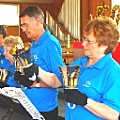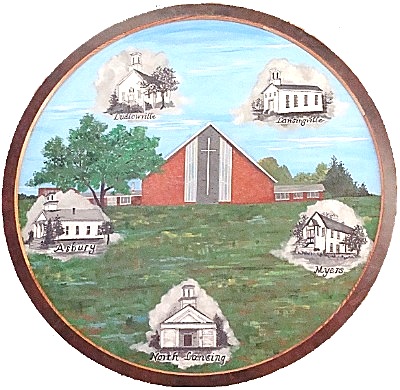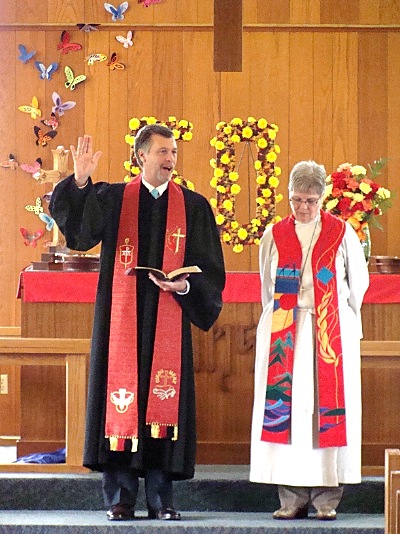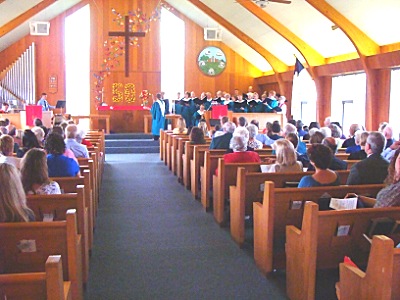- By Dan Veaner
- Around Town
 Print
Print  Lansing United Methodist Church (LUMC) kicked off its 50th anniversary celebration last Sunday with a visit from the Bishop, a conversation with its founders, and a concert that featured an extended choir of 56 singers. The church, perched on a hill overlooking the Lansing schools and Cayuga Lake, was the result of a merger between five smaller Lansing and churches. Part of the reason for the merger was that the churches shared one minister. But there were other reasons as well.
Lansing United Methodist Church (LUMC) kicked off its 50th anniversary celebration last Sunday with a visit from the Bishop, a conversation with its founders, and a concert that featured an extended choir of 56 singers. The church, perched on a hill overlooking the Lansing schools and Cayuga Lake, was the result of a merger between five smaller Lansing and churches. Part of the reason for the merger was that the churches shared one minister. But there were other reasons as well."Most of the churches were built in the horse and buggy days, so our churches needed to be close to where we lived," said Phyllis Howell. "When we began to think about joining the churches together was the possibility that at this point everybody had cars and it was not a hardship to do so. And of course the condition of the churches was part of the consideration of why we needed a new church. It was the wisdom of those people who were in charge of those churches, a miracle that they could come together."
 This painting by church member and former Lansing second grade teacher Sue Frahm depicts the Lansing United Methodist Church and the five churches that joined together to form the new congregation.
This painting by church member and former Lansing second grade teacher Sue Frahm depicts the Lansing United Methodist Church and the five churches that joined together to form the new congregation. Founders Betty Ellis, Maryanne Howe, Jackie Baker, Mary Benson, Barbara Dunlop, Phillis Howell, Jean Bishop and Fannie and Paul Welsh
Founders Betty Ellis, Maryanne Howe, Jackie Baker, Mary Benson, Barbara Dunlop, Phillis Howell, Jean Bishop and Fannie and Paul WelshSunday's service was led by Paster Jane Sautter with a sermon by Bishop Mark Webb, who has been the Episcopal leader of the Upper New York Area for just over a year. After a short break founders shared memories of the five, small churches around town and the circumstances of their merging. Former pastors were among those reminiscing. After lunch a concert of hymns was presented by the regular and children's choirs and Bell's Angels, the church's bell choir and an extended choir that included church members past and present.
The original founders were Jackie Baker, Jeanne Barron, Mary Benson, Marion Bickal, Jeanne Bishop, James Bower, Pat and Connie Conlon, June Darfler, Ev and Meredith Davis, Betty Ellis, Jane Emerick, Marion Howe, Phyllis Howell, Laura Green, Robert and Jeanne Jolly, Grey Larison, Judy Sweazy, Kate Payne, Mary Stull, Betty Trinkl, Virginia Rinker, Fannie and Paul Welch and Floyd Wilson. The land where the church currently stands was owned by the Lansing Central School District at the time, and School Superintendent Ray Buckley arranged for the church to procure the land.
 Bishop Mark Webb and Pastor Jane Sautter
Bishop Mark Webb and Pastor Jane SautterWhile congregations suffered cold, deteriorating buildings and uncomfortable trips to outdoor bathroom facilities, the biggest hurdle in merging was getting church leaders to let go of their smaller churches and communities and traditions to come together in a new, larger church. Mary Benson recalled how the Ludlowville congregation made the decision to merge.
"We had to vote on whether we were going to join to worship," she said. "But it meant closing the Ludlowville Church. There were a couple of pillars of the Ludlowville Church that weren't going to see that church close. That was sinful! Several of us said, 'Let's have a straw vote'. We did have a straw vote and the two that were pillars of the church that were against it. They could see that the majority wanted to join in. They backed off and we voted unanimously to join in."
Eventually the church was made from prefabricated units, including a sanctuary and narthex, classroom wing, fellowship hall and offices and additional classrooms. But that was not the only idea that was floated 50 years ago.
 It was a full house for Sunday morning worship
It was a full house for Sunday morning worship"There was a time where they talked about moving the Asbury Church (which is now a private home) down on the corner opposite the gas station at the foot of the hill," said Fannie Welch. "I couldn't imagine moving that building. And Asbury was closed for a period of time back in the late 30s when they didn't have enough money to keep things going."
Today the church is a unified and thriving piece of the Lansing community. The celebration service attracted an SRO crowd, filling the sanctuary, with extended choir singers lining the outer aisles. Pastor Jane Sautter challenged the congregation to emulate the founders of the church by 'thinking big' again about what will come in the next 50 years.
v9i39



